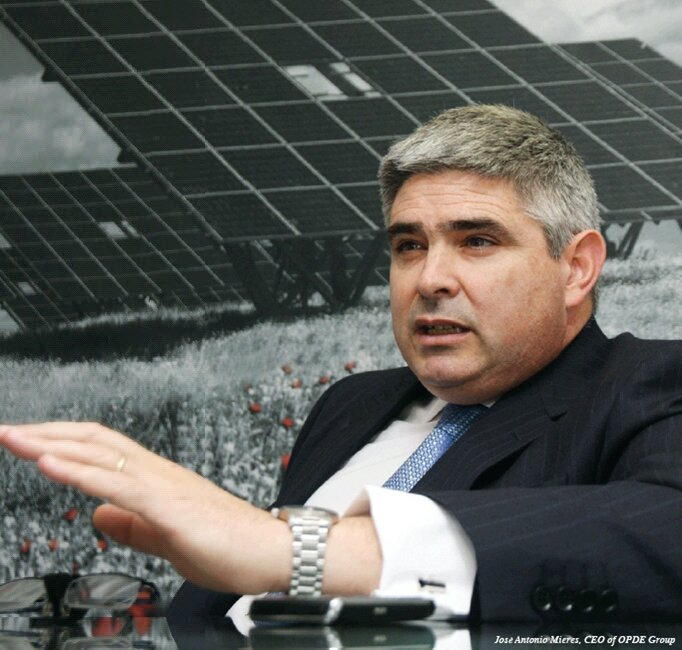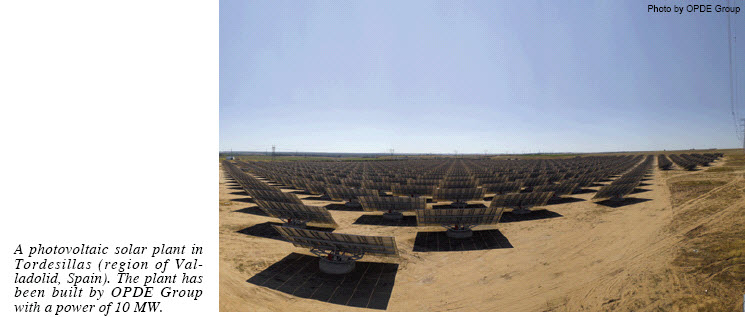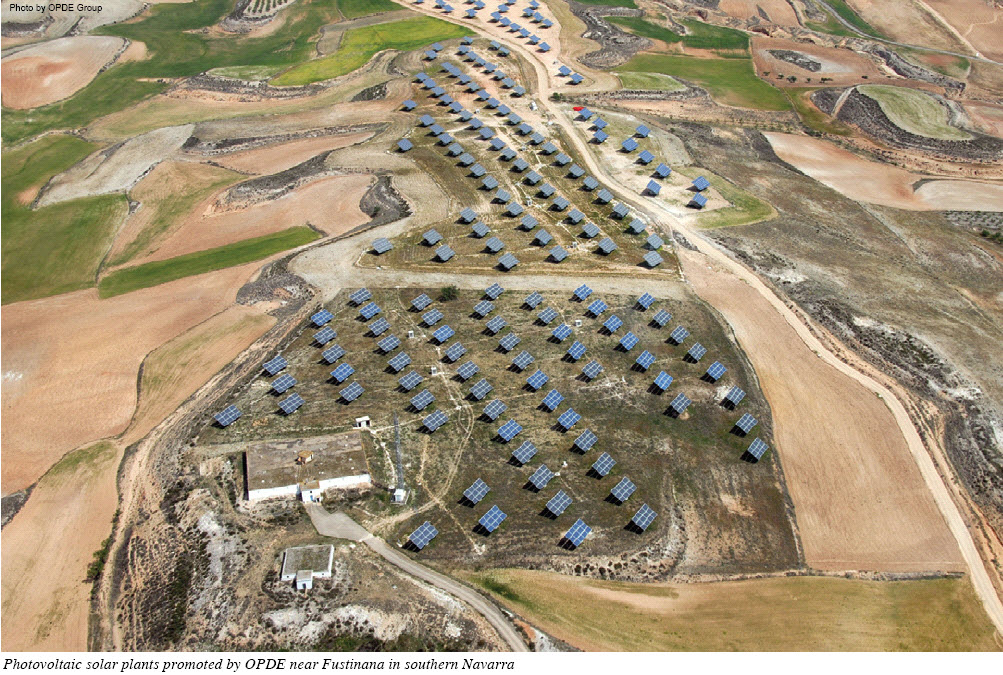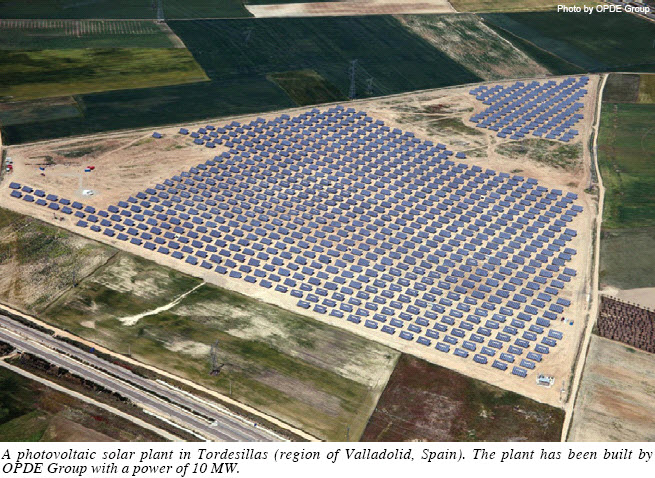Reported by Stella Lee (pved1@infothe.com)

Could you start off by telling us about yourself and OPDE Group?
I have a degree in electromechanical engineering ICAI since 1980. Since then, all my professional life has been dedicated to energy, more specifically to power generation. I started with fossil power generation, mainly pulverized coal and I went through nuclear, biomass, hydraulic, wind and solar PV and CSP. So I have a broad picture of the different alternatives in power generation.

I have a good background in business administration with an MBA at European Business School, Madrid, and several BA courses at Madrid Politechnic University.
I spent the last fifteen years of my professional life within the Iberdrola Group, one of the best places in the world to learn about power business.
Regarding OPDE Group, it was founded in 2005 and has become in the last five years a relevant player in the photovoltaic sector not only in Spain but also at an international scale. OPDE has supplied a large amount of photovoltaic materials, just a few numbers:
-282 MW in 1-axis and 2-axis and fixed solar trackers have been manufactured.
-528 MW in inverters + 284 MW in modules have been supplied.
-102 MW of PV plants that have been developed by our group are in operation.
We integrate three main pillars in our business:
-MECASOLAR is the company that specializes in the design, manufacture and distribution of 2-axis solar trackers, 1-axis trackers and fixed structures.
-PROINSO is nowadays a leading worldwide distributor of photovoltaic materials, mainly modules and inverters.
-OPDE PHOTOVOLTAIC is the company which develops, structures the financing, builds the plants and carries the O&M for the life of the solar farm.
We have operations in Spain, Italy, Greece, France, Germany, the U.S.A., Canada and an office in China. We have more than 1,200 installers within our worldwide net of Qualified Installers (QI).
What first motivated you to start working in the solar energy field?
Around 1994, part of the team that I managed was working in environmental economics, mainly assessment of environmental externalities, GHG economic impact and assessment of command and control versus market driven policies.
I discovered the importance of those issues not only from the economics standpoint, but as the alignment with the new megatrends that would change the world. Low carbon power generation means efficiency, energy harvesting, distributed generation and security of supply that is a key issue in the near future.
Those were the main reasons that made me jump to renewable energy and contemplate it as a good opportunity for the future.
I consider solar as a low impact technology, easy to harvest, with low variability and with a large potential for technological development and large-scale implementatio, so it can be considered as an intrinsic candidate to enhance the security of supply. On top of that, I have to admit that I had a lot of fun, and I still do.

In your view, what policies need to be in place to support the continuing development of solar industry in Spain?
We have to admit that the current economic scenario in Spain has a severe impact in the development of the solar PV industry. The new regulations that came into force last year caused a shock wave in our sector, and the PV sector is suffering the consequences.
But answering your question, the main concept that has to be considered in the design and implementation of the new policies is stability in the legal framework. This sector has a clear need of capital and the financing in a turbulent and unsecure regulation is just very cumbersome and expensive.
In order to invest, it is very reasonable to ask for visibility of the future and for a set of rules that are stable and not retroactive. If we have this kind of environment, we can progress in being more efficient and get closer to the grid parity range.

What challenges exist in Europe, in terms of transmission, and what solutions are emerging?
Transmission of power is ready to go through a big change in concept and therefore in the integration of new technologies. The ‘smart grid’ concept will increase the information flow between consumers, generation and distribution and what is more important will increase the intelligence of the net by processing this information flow about consumer needs, prices, cost, constraints, etc. It will enlarge the concept of energy market by increasing the amount of actors, with relevant information and able to take decisions that fit their needs.
This new concept will increase the security of supply, the resilience of the grid, the efficiency and the quality of supply. Al those issues are strategic challenges but also opportunities for Europe.
Solar generation will be part of the system, but we will see energy storage in different forms that will increase the potential penetration of renewable power, FACTS will be part of the net and will increase the controllability and capacity of the AC grid, the electric vehicle will be integrated as a new consumer.
What is the ceiling for PV in Europe and how central will it be to energy strategy?
I have to admit that I am very bad as a prophet, so let me put a safe harbor clause before I say something.
The figures that EPIA gave in EPIA SET for 2020 study show that “PV could provide up to 12% of the EU electricity demand by 2020 provided specific boundary conditions are met, and be competitive with other electricity sources in as much as 76% of the EU electricity market by 2020, in the absence of any form of external price support or subsidy”.
The study seems very professional and I have to agree with those numbers.
My own analysis is based in my ‘common sense’, so it is more difficult to quantify. I am sure that the economic and financial turmoil will not help and will put pressure on prices and total amount of MW.
In a scenario of high oil/gas price due to some political incident we will see the ‘security of supply’ issue being factored in, and, therefore, the environment for solar industry will be sweeter.
If the impact of GHG is more visible in the near future and the economic impact is more obvious, Europe will put an emphasis on low carbon generation and will include in the equation the externalities of conventional generation.
Those two factors are for me the key drivers behind the impulse of solar. Solar goes with the future, it will take more or less, but it is very difficult to forget that it is a source of energy that we have every morning at home for free, that does not use water, does not have exhaust gases, etc.

Overall, how are the concerns that reductions in government incentives will halt growth in installations of PV systems in 2011 affecting OPDE Group?
We are operating in different areas of the world, in fact Spanish operations are 12% of our revenue. Therefore, we do not expect a large impact in 2011, we are opening offices in India and Australia and we are active in Europe and the U.S.A., this geographical diversity with presence in emerging markets in a natural hedge against surprises.
In any case, we are looking very closely the evolution of the market, and the regulation in different countries.
Do you see 2011 as a growth year for OPDE Group and Spanish solar market?
As I said before, the Spanish market is a marginal source of revenues for OPDE, even so we expect a growth in our operations in Spain.
Regarding the Spanish market, it is more difficult to say since it depends a lot on the final results of the regulation and the financial market. I have to admit that the Spanish market is not in a mood for jokes, I think that the feeling is even worse that, it should be.
What are your revenue and profit forecasts next year on MECASOLAR versus PROINSO (OPDE subsidiaries)?
Forecast for 2011 shows a revenue in Proinso of 320 M and 50 M in Mecasolar with an average margin of 12%.
What’s your growth plans in terms of installed megawatts over the next 5 years?
Our strategic plan for the next four years shows 305 MW installed.
What are your main strategic guidelines?
Our strategic plan is based in five guidelines that will make us more competitive, will decrease our risk profile and will make us grow based in new geographic markets and innovative products:
-Improvement of the operating efficiency,
-Increase the portfolio of renewable technologies,
-Innovation as a source of value creation,
-Stable portfolio of investments linked to renewables,
-Internationalization / geographic expansion.
Stella Lee is Editor of InterPV. Send your comments to pved1@infothe.com.
For more information, please send your e-mails to pved@infothe.com.
ⓒ2011 www.interpv.net All rights reserved. |



